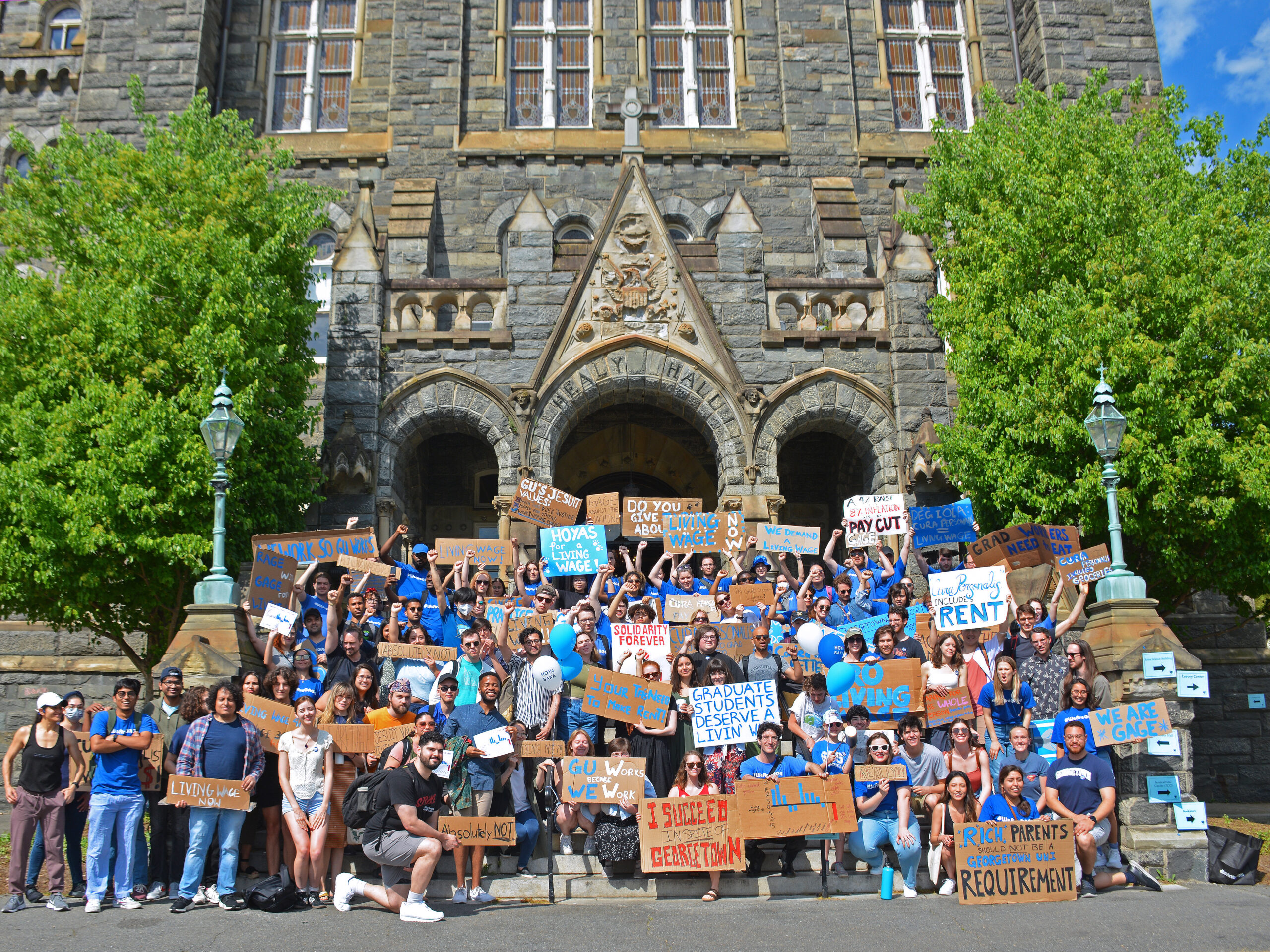The Georgetown Alliance of Graduate Employees (GAGE), which represents the over 1,000 graduate workers at Georgetown, ratified their second successful contract campaign on Aug. 18 with 98.7 percent approval from members for the collective bargaining agreement. The deal comes after the release of a report in which nearly 82 percent of graduate student workers claimed their compensation does not meet their financial needs.
GAGE’s contract includes a 12 percent initial increase in pay, a 0.5 percent difference in increased raises every year, and better support for undocumented and international workers, as well as those with children. Incoming research and teaching assistants will be guaranteed $22 per hour with a 2.5 percent raise every subsequent year and longer parental leave.
The contract also promises institutional support for workers filing immigration forms.“Support and privacy for undocumented and migrant students is something that [GAGE] was incredibly proud to push forward as it wasn’t included in the first contract,” Nick Gonzalez, research assistant at Georgetown’s law school and a representative of the bargaining team, said.
The GAGE bargaining team introduced their demands on Oct. 14 and led university-wide protests and sit-ins throughout early 2023. GAGE’s efforts continued into the summer after they reportedly experienced difficulties with the university’s administration during negotiations — resulting in a longer negotiation timeline than their first contract in May 2020 had.
Despite roadblocks, members of GAGE’s bargaining team are largely satisfied with the outcome.
“We’re very impressed with the outcome,” said Brent McDonnell, a Ph.D. student and GAGE’s first treasurer. “The increases in pay are significant, and this result shows our ability to win at the table.”
Still, McDonnell is concerned that the university might delay in following up on the new contract.
“We recognize that this contract was finished at the beginning of the school year after some complications,” he said. “For someone like me, finishing at the end of this academic year, the goal is the implementation and enforcement of the contract, and should be kept up with as a priority.”
Gonzalez also underscores that while this contract expanded upon GAGE’s previous work, not all of GAGE’s demands were met.
“Housing and transportation didn’t get as far as we were initially discussing, but I think that’s an opportunity for the next contract and for GAGE, as well as other student groups, to continue their advocacy,” he said. “Transportation subsidies or a U-pass like what George Washington University can alleviate the cost for commuter students.”
“We made some progress, but there’s room for growth in the future,” he added.
Since graduate students’ pay is set for the next four years, GAGE will not restart negotiations until 2027. Still, McDonnell emphasized the necessity for GAGE to remain present and visible on campus. “We need to always make sure people are involved,” he said. “We have a great leadership group and membership, but are always looking to expand.”
Both Gonzalez and McDonnell recognize that support from the undergraduate community and other student organizations’ mobilization efforts are vital components for GAGE’s success.
“The solidarity we experienced [with undergraduate students] helped us when they came to our sit-ins and demonstrations because they were supporting student workers they share a campus with,” said Gonzalez.
“It’s a reflection that we, as the union, are doing good work. We want to make sure we’re not the only union doing well,” McDonnell said, referring to dining, adjunct faculty, and utilities staff unions. With recent pushes for the university to better meet the demands of unions and increasingly pro-union sentiments on campus, GAGE hopes to continue engaging with various groups to support them in their advocacy efforts.
Gonzalez hopes to reassure graduate and undergraduate students alike that GAGE will continue organizing and raising awareness of on-campus issues but that those continued efforts should not undermine all the progress they have made.
“These wins were hard-fought while putting together great proposals, justifications, and overall advocacy so we could ultimately achieve what we did,” Gonzalez said.
Editor’s Note: This article was updated to remove a statement suggesting that the university may have stalled negotiations, that adjunct faculty are unionized, to remove a statement suggesting that pay increases made were intended to match inflation, and to remove the names of administrators involved in negotiations.




